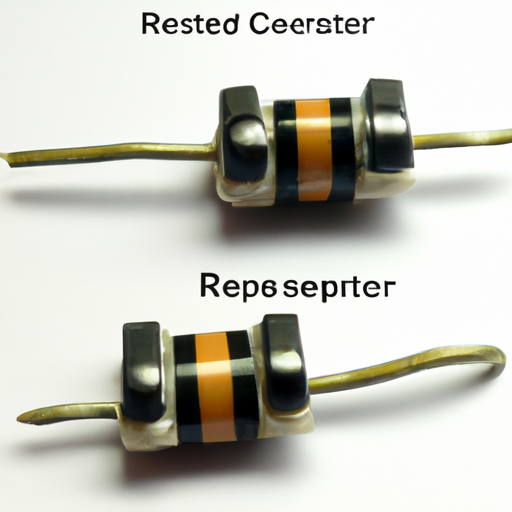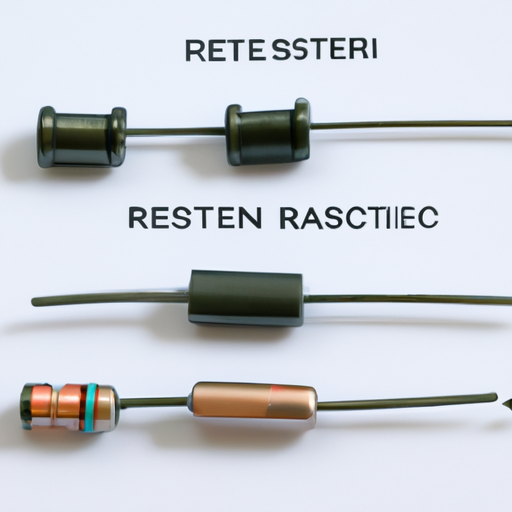What are the advantages of high voltage resistor products?
What are the Advantages of High Voltage Resistor Products?
I. Introduction
In the realm of electrical and electronic applications, resistors play a pivotal role in controlling current flow, dividing voltages, and protecting sensitive components. Among the various types of resistors, high voltage resistors are specifically designed to handle elevated voltage levels, making them essential in numerous applications. This blog post will explore the advantages of high voltage resistor products, shedding light on their significance in modern technology.
II. Understanding High Voltage Resistors
A. Explanation of High Voltage Resistors
High voltage resistors are components that can withstand high voltage levels, typically defined as resistors with voltage ratings exceeding 1,000 volts. These resistors are classified based on their voltage ratings, which can range from a few kilovolts to several hundred kilovolts. The materials used in high voltage resistors are crucial for their performance; common materials include carbon, metal film, and ceramic, each offering unique properties that enhance the resistor's functionality.
B. Applications of High Voltage Resistors
High voltage resistors find applications across various industries, including:
1. **Power Electronics**: In power supply circuits, high voltage resistors are used for voltage division, load testing, and current limiting.
2. **Telecommunications**: These resistors are essential in signal processing and transmission systems, ensuring signal integrity and stability.
3. **Medical Equipment**: High voltage resistors are critical in devices such as X-ray machines and MRI scanners, where precise voltage control is necessary for safe operation.
4. **Industrial Machinery**: In manufacturing and automation, high voltage resistors are used in motor drives and control systems to manage power distribution effectively.
III. Key Advantages of High Voltage Resistor Products
A. Enhanced Performance
High voltage resistors are engineered to deliver superior performance in demanding environments.
1. **High Power Handling Capabilities**: These resistors can manage significant power levels without overheating, making them suitable for high-load applications.
2. **Improved Thermal Stability**: High voltage resistors are designed to maintain their resistance values under varying temperature conditions, ensuring consistent performance.
3. **Precision and Accuracy in Resistance Values**: Many high voltage resistors offer tight tolerance levels, which is crucial for applications requiring precise measurements and control.
B. Safety and Reliability
Safety is paramount in high voltage applications, and high voltage resistors are built with this in mind.
1. **High Dielectric Strength**: These resistors are constructed to withstand high electric fields, reducing the risk of dielectric breakdown.
2. **Reduced Risk of Electrical Breakdown**: The robust design of high voltage resistors minimizes the chances of failure, ensuring reliable operation in critical applications.
3. **Long Lifespan and Durability**: High voltage resistors are often made from materials that resist wear and degradation, leading to a longer operational life.
C. Versatility in Applications
High voltage resistors offer remarkable versatility, making them suitable for a wide range of applications.
1. **Wide Range of Resistance Values**: They are available in various resistance values, allowing for flexibility in circuit design.
2. **Customization Options for Specific Needs**: Many manufacturers provide customization options, enabling engineers to specify resistance values, power ratings, and physical dimensions.
3. **Compatibility with Various Circuit Designs**: High voltage resistors can be integrated into different circuit configurations, enhancing their usability across multiple platforms.
D. Cost-Effectiveness
Investing in high voltage resistors can lead to significant cost savings over time.
1. **Long-Term Savings Due to Durability**: The robust nature of high voltage resistors means they require less frequent replacement, leading to lower overall costs.
2. **Reduced Maintenance Costs**: With their reliability, high voltage resistors contribute to lower maintenance needs, allowing for more efficient operation.
3. **Availability of Bulk Purchasing Options**: Many suppliers offer bulk purchasing options, which can further reduce costs for businesses that require large quantities.
IV. Technological Advancements in High Voltage Resistors
The field of high voltage resistors has seen significant technological advancements in recent years.
A. Innovations in Materials and Manufacturing Processes
New materials and manufacturing techniques have improved the performance and reliability of high voltage resistors. For instance, advancements in ceramic materials have led to resistors that can withstand higher temperatures and voltages.
B. Impact of Technology on Performance and Reliability
Modern manufacturing processes, such as precision laser cutting and automated assembly, have enhanced the consistency and quality of high voltage resistors, ensuring they meet stringent industry standards.
C. Future Trends in High Voltage Resistor Development
As technology continues to evolve, we can expect further innovations in high voltage resistors, including the development of smart resistors that can provide real-time monitoring and diagnostics, enhancing their functionality in complex systems.
V. Considerations When Choosing High Voltage Resistors
When selecting high voltage resistors, several factors must be considered to ensure optimal performance.
A. Factors to Consider
Key factors include voltage rating, power rating, tolerance, and temperature coefficient. Understanding these parameters is crucial for selecting the right resistor for specific applications.
B. Importance of Selecting the Right Resistor for Specific Applications
Choosing the appropriate high voltage resistor can significantly impact the performance and safety of the overall system. Engineers must carefully evaluate their requirements to make informed decisions.
C. Role of Manufacturers and Suppliers in Providing Quality Products
Working with reputable manufacturers and suppliers is essential for obtaining high-quality high voltage resistors. These companies often provide valuable technical support and resources to assist in the selection process.
VI. Conclusion
High voltage resistors are indispensable components in various electrical and electronic applications, offering numerous advantages such as enhanced performance, safety, versatility, and cost-effectiveness. As technology continues to advance, the importance of high voltage resistors in modern systems will only grow. By understanding their benefits and making informed decisions during the selection process, engineers and designers can ensure the reliability and efficiency of their applications.
VII. References
1. "High Voltage Resistors: A Comprehensive Guide," Journal of Electrical Engineering, 2022.
2. "Advancements in Resistor Technology," IEEE Transactions on Industrial Electronics, 2023.
3. "Understanding High Voltage Components," Electronics Weekly, 2023.
4. Manufacturer specifications and datasheets for high voltage resistors from leading suppliers.
By recognizing the advantages of high voltage resistor products, professionals can leverage their capabilities to enhance the performance and safety of their electrical systems.






